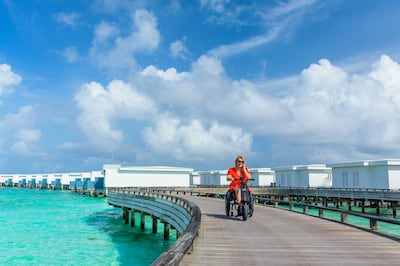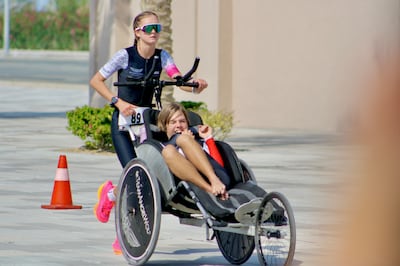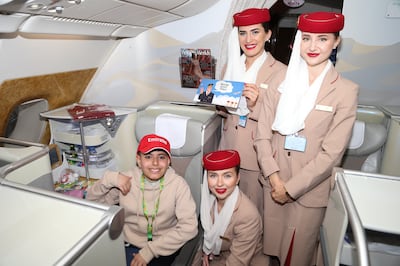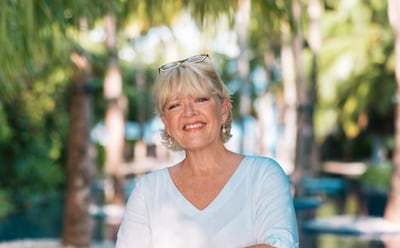The word “vacation” triggers sadness for Delphine Watson. It reminds her of a time she will likely never experience again. That’s because her 20-year-old son, Rio, has a rare chromosomal condition called 1q44 deletion, which means he has seizures, intellectual disabilities, sensory hypersensitivity and is non-verbal. So she’s his full-time carer, whether they’re in Dubai, Spain, Australia or the US.
“Going off with Rio isn’t a ‘vacation’ like the holidays others have or the holidays I had in my life before Rio,” she told The National. “For me it’s an opportunity to experience being somewhere else while looking after Rio.”
“To me, the word ‘vacation’ conjures up words like rest, relaxation and freedom. And traveling right now definitely doesn’t fit any of those words.”
For the Watsons, it’s hard work, expensive and logistically stressful: “As a caregiver, it’s often more relaxing to be at home, where everything he needs is there and the world around him is organised to suit his needs. There’s safety there.”
But a growing number of people working in the tourism industry are finding it’s not that hard.
An industry-wide “failure”
The travel industry as a whole is failing to provide fair and real opportunities for people with disabilities, says Richard Thompson, founder of IncluCare, a UK organization known for driving an “inclusion revolution” across the tourism industry by providing comprehensive and accessible training, assessments, and certifications.
The industry’s failures stem from fear, he says, “and the fear that comes from a lack of understanding can only be mitigated by leadership that invests in educating every staff member who comes to work and cares about every guest who stays.”
According to the World Health Organization, an estimated 1.3 billion people, or 16% of the world’s population, currently live with a severe disability. This means the global purchasing power of the disability market is approximately $10 trillion per year, IncluCare said.
Despite these economic benefits, tourism and hospitality businesses still have a long way to go to address this market, with “completely missing, scarce or hard to obtain detail on accessibility and inclusion” which is “essential for making relevant, reliable and informed purchasing decisions,” Thompson said.
“Overall, it’s a fairly hostile and unwelcoming environment, which means that the vast majority of disabled people around the world, even though they have the ambition, desire, resources and time to explore and discover the planet, don’t do so.”
He says it comes down to a lack of trust and confidence, which leads families like Delphine to stay in their “safer” homes.
“This is a shocking situation and it must change.”
Is it a tough job?
It all starts with understanding what inclusion means, which Thompson says is very different from accessibility. “Accessibility is being invited to the party, inclusion is being asked to dance,” he recently told the Travel Trade Gazette.
But the sheer number of physical and hidden disabilities that tour operators have to cater for can make it a daunting task, says Narelle McDougall, general manager of Amilla Maldives, the world’s first IncruCare certified resort.
“Taking a wheelchair on a speedboat or seaplane may seem impossible because it would be too much liability,” she told The National, adding that the idea of liability for disabled people could also put companies off from a legal perspective.
But none of this is an excuse for not catering to this market, and it can be implemented incrementally, says McDougall.
“We started with wheelchair access but since then we’ve had guests with hidden disabilities such as dwarfism, muscular dystrophy, motor neurone disease and autism. In each case, we prepare to cater to what they tell us are their unique needs. So it’s a heartwarming journey as we learn as well.”

For example, staff won’t play bodu beru drums on arrival at the jetty for guests with autism, as this could upset them. There are warning systems for the hearing impaired, adaptive yoga and snorkelling activities, and a touch, smell and sound jungle experience is in the works for guests with visual impairments.
The hotel will also introduce dedicated “calm down spaces” aimed at reducing anxiety and stress for guests with autism, learning disabilities and dementia.
“We customise villas and even island bikes to ensure our guests feel truly cared for and listened to, giving them the freedom to experience the island in as rich and stylish a way as they wish.”
To achieve IncluCare certification, the hotel had to prove it was serious about caring for all its guests and educating its staff. The hotel installed ramps in all areas, remodeled villas and trained department trainers. Thompson then audited their progress, and the whole process took six months.
Thompson says it’s about more than just infrastructure: “Most of inclusion happens in real time with staff who are empowered, sensitive, confident and caring.” In addition to investing in education and understanding, Thompson says it’s important for brands to instill the message of inclusion throughout their company and dispel myths and misconceptions around “disability.” Only then can travel companies identify and address physical and non-physical barriers to inclusion for their guests.
“And it’s important that this provision is visible, accessible and detailed enough to be relevant – guests with different mobility, sensory and neurodiversity needs would never stay without it.”
“Fight or flight?”
It’s all these factors that have kept the Watsons from traveling: “No matter how positive and excited you are about travelling, there’s always that stress of not knowing what’s going to happen,” says Delphine, who, with her husband, runs Team Angelwolf, a non-profit that promotes inclusion in the UAE.

She plans for every bad thing that can happen, and says the biggest obstacle to traveling with her family may be her own anxiety: “It’s easy to say you have to be positive and relaxed, but when you live a life where you’re exposed to rejection, discrimination, injustice and disenfranchisement every day, it can feel like you’re constantly living in ‘fight or flight’ mode, especially in situations that are outside of your control.”
It starts from the moment you try to book a trip: you need so much information to make what may seem like a very simple decision to someone without a disability.
For example, which airline should they fly? Does the airline accept the DPNA code, an industry code for special service requests for passengers with intellectual and developmental disabilities? Can they reserve wheelchair assistance and appropriate meals for Rio to eat on board? Because Rio must wear adult diapers and needs full assistance in the bathroom, Delfin must determine how she and her husband will be treated as they try to fit their son into a cramped airplane bathroom? What if restrooms at airports and other facilities are not unisex? How will a mother get her adult son to board?
I believe and I hope [the UAE] It will continue to make progress and become a pioneering example in the world of accessibility and inclusion.
Delphine Watson
“At the airport, how will Rio intuitively cope with the queues, the noise, the stress and the distances he has to walk? On the plane, will he sit quietly for the entire journey? If not, will those around him understand? What will happen if he has a seizure?”
Because Rio needs a 24-hour carer, he also needs to stay in the room with his parents, which is often against hotel policy. “Many hotels are sympathetic in the end, but it takes a very long discussion. Some won’t allow it, and then we can’t stay in the hotel because it wouldn’t be safe for our son.”
Lack of understanding from others, including fellow passengers and staff, is also a major source of stress for Delphine.
Thankfully, Delphine says life is easy in the UAE, where she and her husband have lived for 27 years. “There are unisex toilets at the airport, and sunflower straps. [a sign for people with hidden disabilities to wear] There seems to be a greater awareness that the is being recognised, the DPNA codes are being recognised and staff are being trained.”
Dubai Economy and Tourism announced last year that it would lead the effort to become the first autism-certified travel destination outside the U.S. Emirates Airlines and Dubai International Airport also recently revealed they are improving the travel experience for passengers with neurodevelopmental disabilities, implementing “trip rehearsals” that allow children to practice traveling through the airport and on the plane, and Dubai Airways provides comprehensive information for travelers with disabilities on its website.
 Emirates is making an effort to accommodate passengers with neurodevelopmental disorders. Photo: Emirates
Emirates is making an effort to accommodate passengers with neurodevelopmental disorders. Photo: Emirates
“We’re seeing advances in accessibility from public transport to travel and tourism services, hotels and airports,” she says.
“We don’t feel like an afterthought or a burden – we feel like we’re part of the traveller community. We believe and hope that we will continue to make progress and become a pioneering example globally in the field of accessibility and inclusion, making the UAE a top destination for travellers with disabilities.”
When will this change?
McDougall is hopeful for the industry and thinks disability provisions will become more commonplace. “I hope that rather than just complying with the law, change makers in the hospitality industry will be more genuinely motivated to show kindness and care,” she says. “Of course, there are economic benefits too, if change makers in the industry are serious about it.”

Right now, she says, there are millions of people who think their situation means they can’t experience a resort or activity, “but it can be done, you just need to take extra steps to make sure your guests feel safe and comfortable. There’s a wide market out there waiting to visit your property, you just need to make them feel welcome.”
The opportunities for the travel industry catering to this market, Thompson says, are the same as for every other customer: “Improve, innovate and differentiate product; the opportunity to inspire, chat and seduce; expand aspirations and horizons and ensure brand loyalty.”
The most important thing, he says, is to “treat customers with disabilities the same as any other customer.”
Delfin says companies can no longer afford to be seen to exclude people because of their abilities: “Segregation has to be a thing of the past.”
Until the situation changes, the Watsons plan to continue traveling internationally, no matter what the obstacles, she says. “Rio should have the opportunity to travel and explore the world. He absolutely enjoys it, we need to get away, and my daughter deserves that experience. If families like ours don’t travel because it’s too hard, the travel industry will never change and adapt, and travel will never become easier for all of us.”
“The travel industry needs to listen to our voices and opinions. That’s the only way change will happen.”
Last updated: October 25, 2023, 4:03 AM
